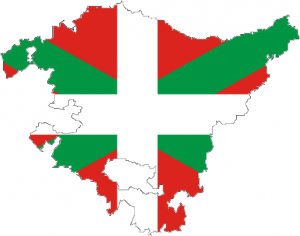By Sarah-Claire Jordan
 Basque Country and everything associated with it may have a bad connotation for those who remember the violent attacks in the late 60s and 70s by a Basque separatist group, but that’s only one small sampling of a people with a unique culture and language. Nowadays, the Basque people have autonomy in their own land, and relations are much better between them and their Spanish or French countrymen.
Basque Country and everything associated with it may have a bad connotation for those who remember the violent attacks in the late 60s and 70s by a Basque separatist group, but that’s only one small sampling of a people with a unique culture and language. Nowadays, the Basque people have autonomy in their own land, and relations are much better between them and their Spanish or French countrymen.
The Basque language is extremely interesting for many reasons, and here are just a handful of them.
1. It is a language isolate with unknown origins
A language isolate is a language that is also its own language family. That is to say, there are no other languages that share the same linguistic ancestors with Basque. Before Modern Basque, there was probably some sort of Proto-Basque that then evolved into a possible precursor for Basque known as Aquitanian. Aquitanian was spoken during the time of Roman rule in what is now Spain and France, but for some reason the Romans mostly left the Aquitanian speakers alone, letting the language survive and eventually evolve into Basque.
2. There are various hypotheses about how it may be connected to other languages
Though Basque does borrow words from languages it has been in contact with, like Spanish and French, in general it has proven difficult to link it to other languages. Nevertheless, many linguists have hypothesized about possible linguistic connections, such as with ancient Iberian, Georgian, and even Dogon, an African language family. Of course, these are all just hypotheses with not enough proof yet.
3. Basque may have influenced Spanish in a few ways
Some linguists may disagree, but others claim that, aside from some Basque loanwords (most notably “izquierda” from Basque “ezkerda”), Basque has had some influence on Spanish. In Old Spanish, the [b] and [v] sounds were different, but the influence of Basque could have eliminated that difference. Words that started with the [f] sound in Old Spanish start with an [h] in Modern Spanish, another possible Basque-influenced change.
4. There are several different dialects of Basque
Today, there are five different dialects of Basque: Western, Central, Upper Navarrese, Lower Navarrese-Lapurdian, and Souletin. They are not all entirely mutually intelligible, which is interesting since the Basque region is not very large. The Western dialect and Souletin are the two dialects of Basque that are the least mutually intelligible.
5. Basque has it’s own style of lettering and number system
Basque uses the Latin alphabet, but there is a font that is uniquely Basque. This font is used to write inscriptions, like those on a gravestone for example. Basque also uses the same number system as Spanish, but Basque millers in particular used to use a number system that utilized circles, lines, and other shapes to represent numbers. No one knows where this system came from. This system of numbering isn’t used anymore, but you might see it in decorations or in other contexts.



